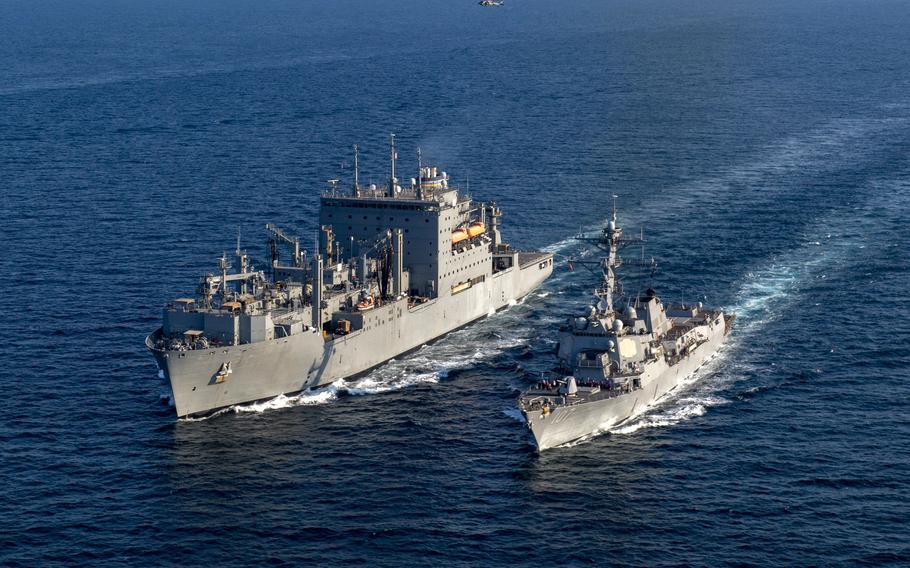
The dry cargo ship USNS Alan Shepard and the destroyer USS Gravely conduct a replenishment at sea in the Persian Gulf on Dec. 8, 2023. The Navy blamed the grounding of the Alan Shepard in Bahrain on July 15, 2023, on the absence of the ship’s master from the bridge at a key moment. (Merissa Daley/U.S. Navy)
A nearly 700-foot-long U.S. Navy cargo ship ran aground in Bahrain in 2023 almost immediately after its top officer left the bridge to eat dinner, a service investigation found.
The decision by the master of the USNS Alan Shepard to leave the bridge and place a junior officer in charge was one of the key reasons for the ship’s grounding, according to a recently released summary of an investigation by U.S. Naval Forces Central Command.
The incident last year on July 15 left the Alan Shepard stuck in the shoals for more than seven hours but caused only minor paint scratches on the hull and left no one injured, the investigation said.
The U.S. narrowly avoided a disaster, said Sal Mercogliano, a maritime historian and professor at Campbell University in North Carolina.
“It could have easily resulted in the loss of the ship,” Mercogliano said by phone last week after reviewing the investigation summary.
The Alan Shepard, launched in 2006, transports dry cargo and ammunition, and has accommodations for more than 120 people, according to the Naval Vessel Register.
The ship is crewed by civilian mariners licensed by the U.S. Coast Guard.
The ship’s master when it went aground was Adel Desouki, a civilian captain with the Military Sealift Command, according to a statement by Cmdr. Tim Hawkins, NAVCENT spokesman at the time of the incident.
The ship had 85 crewmembers aboard during the grounding, Hawkins said.
The Alan Shepard was moving to a pier at Khalifa Bin Salman Port in Bahrain to complete repairs to one of its marine diesel generators, NAVCENT’s investigation summary said.
Bahraini port authorities told the crew to wait for a harbor pilot to guide them into the pier, the summary said.
The ship transited toward a designated waiting area. At 4:49 p.m., the master of the ship handed control to the third officer, told him to stay the course and keep the ship within the waiting area.
The master, the navigator and the chief mate all then left the bridge to eat dinner, according to the findings.
The third officer, who was not named in the report, navigated the ship into the waiting area but became distracted by a fishing boat, the report said. He turned the ship to the right to avoid the fishing boat, but in doing so ran the Alan Shepard into the nearby shoals.
Roughly 20 minutes separated the ship’s master leaving the bridge and the Alan Shepard running aground, according to the investigation summary and publicly available maritime data reviewed by Stars and Stripes.
The investigation blamed the grounding on officers failing to follow navigation procedures and the ship’s master not being present on the bridge as required by policy, the summary said.
The ship’s standing orders said the master is supposed to be on the bridge near shallow waters, such as those in Bahrain.
“This for me solely falls on the shoulders of the master,” Mercogliano said.
A ship’s master would not typically leave the bridge while sailing through Bahrain’s busy waters, said Mercogliano, who has transited the region before as a merchant mariner.
“You’re asking your most junior officer to do some tight maneuvering,” Mercogliano said, adding that the master could have gotten food delivered to the bridge.
NAVCENT on Monday declined to provide information beyond what was released in the investigation summary.
Desouki currently holds a valid merchant mariner credential, Melissa Leake, a spokeswoman for the U.S. Coast Guard, said in an email Friday.
The Alan Shepard is underway in the Middle East, according to data by the maritime monitoring site MarineTraffic.com.
Ship groundings can cause significant damage to hulls, propellers and surrounding infrastructure.
In 2017, the missile cruiser USS Antietam ran aground in Japan and leaked an estimated 1,100 gallons of hydraulic oil into Tokyo Bay, Stars and Stripes reported at the time.
And in 2014, the frigate USS Taylor ran aground in the Black Sea, causing $4.8 million in damage and leading to the commanding officer’s dismissal.